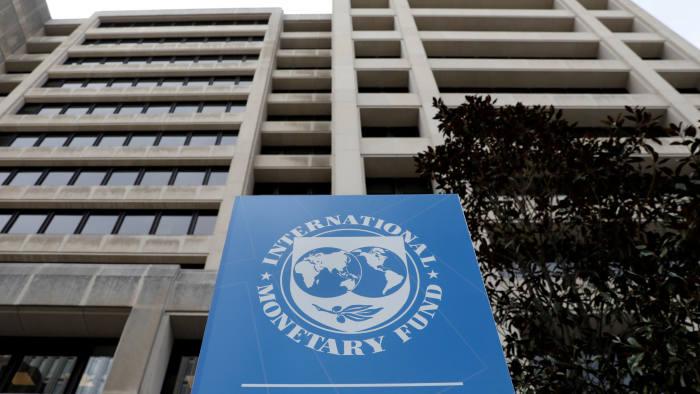IMF’s Double Standards on Pandemic Packages

Image Courtesy: Reuters
The COVID-19 crisis has seen a very different response from the advanced countries compared with the Third World countries. The former have unrolled substantial fiscal packages for rescue and recovery while the latter have been trapped in fiscal austerity.
Among Third World countries, India’s fiscal package has been perhaps the most niggardly, amounting to no more than 1% of GDP; but even other Third World countries have not fared all that much better.
By contrast, the US under Donald Trump had unrolled a rescue package of $2 trillion, which is 10% of its GDP; and Joe Biden has announced a further package of $1.9 trillion of which at least $1 trillion is direct fiscal transfer to people. Together these two come to about 20% of US GDP (though spread over more than one year). The European Union, too, has unrolled substantial fiscal packages for rescue and recovery from the pandemic.
What is noteworthy is that the International Monetary Fund (IMF) has actively supported and encouraged such packages, in a departure from its usual insistence upon fiscal austerity. For the Third World countries, too, it has expressed itself in favour of larger public expenditure in the context of the pandemic. But, according to an analysis by Oxfam, while giving loans to Third World countries during the pandemic, the IMF has gone back on these pious words and once again imposed fiscal austerity on these countries!
Oxfam’s analysis found that out of 91 IMF loans negotiated with 81 countries after March 2020, as many as 76 encouraged or required austerity measures. Such measures included cuts in public expenditure that would entail reduced levels of public healthcare expenditure, and pension payments; they involved wage-freezes or wage-cuts that would reduce the incomes of doctors, nurses and other workers in public healthcare facilities, and cuts in unemployment benefits and sick pay.
Oxfam gives a number of specific examples. In the case of Ecuador, the IMF recently agreed to a $6.5 billion loan, but the catch was its “advice” to Ecuador to cut healthcare expenditure, to cut fuel subsidies on which the poor people depend heavily, and to stop cash transfers to people who are unable to find work.
Nine countries, which include Angola and Nigeria, have been asked to increase or introduce value-added taxes which fall heavily on the poor as they apply to food, clothing and household supplies.
In 14 countries, which include Barbados, El Salvador, Lesotho and Tunisia, there are likely to be cuts or freezes in public sector wages and jobs. Such cuts would mean fewer government doctors, nurses and healthcare workers, and that too in countries that already have extremely small numbers of such personnel per head of population.
This insistence on austerity on the part of IMF shows two things: first, that it clearly discriminates between countries, against the poor as distinct from the rich. It may be willing to avoid austerity measures for the rich countries but never for the underdeveloped ones.
Second, no matter what it professes, no matter how “reasonable” it may occasionally sound, IMF invariably pushes on all occasions the same agenda, of austerity and privatisation, vis-à-vis the Third World countries. Its occasional “sensible” pronouncements, which run contrary to the logic of its “conditionalities”, encourage progressive economists to entertain the belief that IMF may be changing, and becoming more humane. But these pronouncements, often in the form of research papers by its staff published in its journal, are just a facade behind which it keeps doing what it has always done.
Another instance of such duplicity is when it showed some appreciation of the need to impose capital controls in Third World countries, which made many progressive economists feel that IMF after all was changing. But in its actual behaviour, there was not an iota of change; its insistence on keeping the economies of the world open to free capital flows, including of finance, never wavered.
One cannot help concluding that its sympathy for views contrary to its “conditionalities”, is just a public relations gimmick on the part of IMF to acquire greater credibility among progressive economists.
An apprehension inevitably arises here. The divergent positions adopted by IMF vis-à-vis advanced and underdeveloped countries in the context of the pandemic, may well get carried over beyond the pandemic, to constitute the basis for a new international regime that would facilitate for the metropolis a recovery from the economic crisis unleashed by neoliberal capitalism.
This regime would entail a fiscal stimulus undertaken by governments in advanced countries for the recovery of their respective economies from crisis; but for the Third World countries there would be continued austerity, so that they continue to be afflicted by massive unemployment and income compression which also has the “advantage” of ensuring that the recovery in the advanced countries is not constrained by the emergence of inflation.
This strategy, in other words, would entail a cordoning off of the advanced countries from the Third World economies. This would be done through protection, such as what Trump had introduced in the US but now generalised to the advanced capitalist world as a whole, together with a fiscal stimulus whose effects are kept confined to the domestic economies of the advanced countries. The incomes in the advanced countries, in other words, will increase while incomes in the Third World countries will remain compressed through fiscal austerity and lack of access to metropolitan markets.
Since the prices of a whole range of primary commodities produced in the Third World are linked to the incomes of the people there, which determines the local demand for such commodities, the compression of incomes in the Third World will also ensure a demand compression which will release such commodities for the requirements of the metropolis at non-increasing prices.
Under neoliberal capitalism, there had been a diffusion of activities from the metropolis to the Third World, especially to Asian countries, but not only to them, which had “de-segmented” the world economy. The strategy which one apprehends may now be put in place, of which the kind of policy that IMF is pursuing is perhaps a forerunner, will mean a “re-segmentation” of the world economy, with corporate-financial oligarchies of advanced countries on one side, doing some “damage control” by stimulating a recovery in the metropolis that reduces unemployment and distress among metropolitan workers, and the working people of the Third World on the other side, with continued stagnation and recession in Third World economies. The big bourgeoisie in the latter economies will find plenty of room in such an arrangement for enriching themselves, by investing even in the metropolitan economies.
This would mean a re-enactment of the colonial scenario. Under neoliberal capitalism as it existed until now, even though the working people in the Third World had witnessed increased nutritional poverty, there had at least been a relocation of activities from the metropolis to the Third World; the era of such relocation may well be coming to an end. And the hostility of the US to China could well provide a cover for the adoption of policies both in the US and elsewhere in the metropolis for discouraging such relocation.
Progressive economists in the West will no doubt expose such blatant discrimination and raise their voices against it, but if it is persisted with, then Third World countries will be forced to delink themselves from such a blatantly discriminatory global order and find alternative stimuli for their growth.
The global order, of course, has always been discriminatory against the working people of the Third World, but this was camouflaged earlier by the experience of high GDP growth that the relocation of activities from the metropolis had made possible. But if such relocation is foreclosed by blatant discrimination then there will inevitably be an upsurge of resistance from the Third World.
The dream of harmony among nations so that rich nations help the poor ones to recover and prosper, that is entertained by many progressive economists, is a noble one; but, alas, it is incapable of being realised within the capitalist order. The IMF’s double standards in the context of the pandemic, which may well carry over beyond the pandemic, serves only to underscore this point.
Get the latest reports & analysis with people's perspective on Protests, movements & deep analytical videos, discussions of the current affairs in your Telegram app. Subscribe to NewsClick's Telegram channel & get Real-Time updates on stories, as they get published on our website.
























